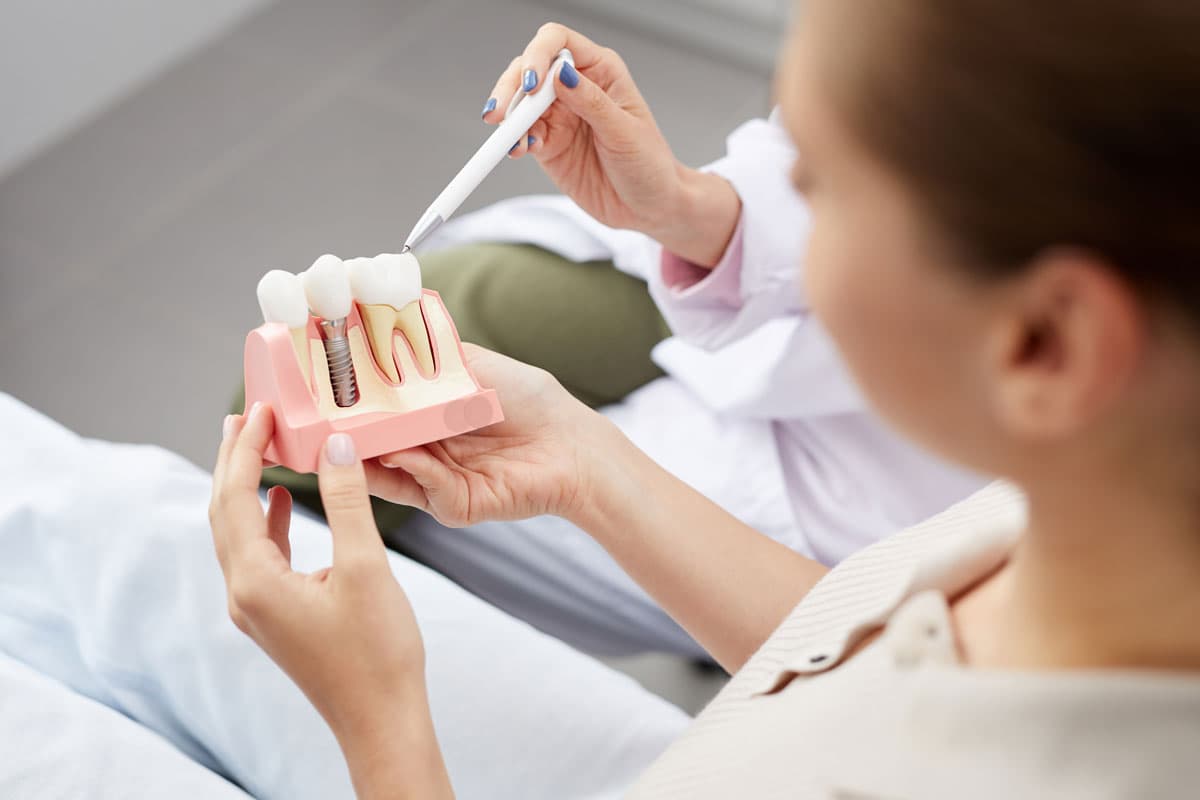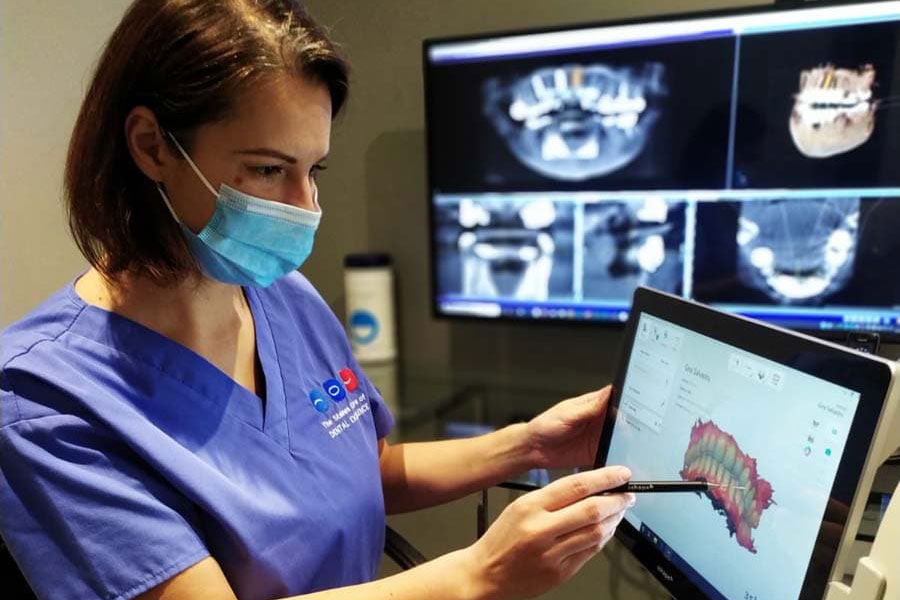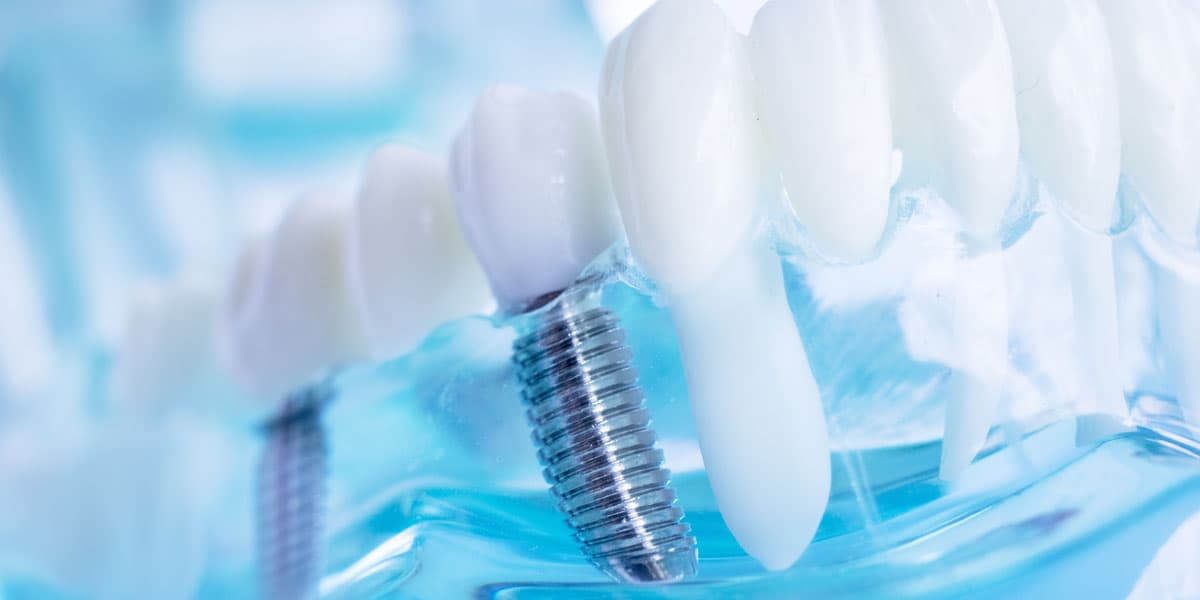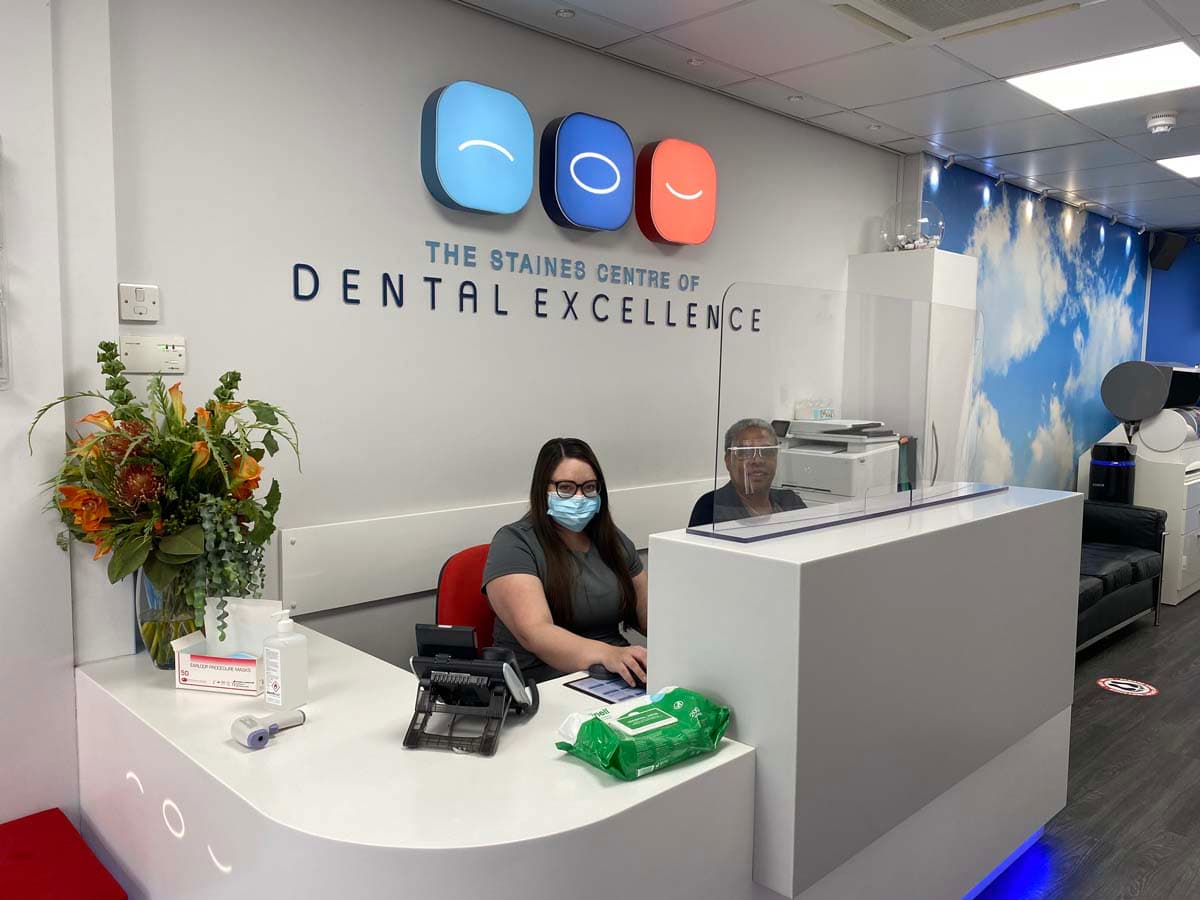Dental Implants
Dental implants are now a popular treatment to replace missing teeth as they provide a longer-term solution, slowing down bone loss and preserving healthy tooth tissue.
People lose teeth all the time, either through damage when teeth are knocked out (rugby players and boxers commonly experience this) or due to decay, gum disease or old age. Whatever the reason is for losing your teeth we can replace for both aesthetic and functional reasons.
Treatments
What is a Dental Implant?
A dental implant is an artificial substitute for the root portion of your natural tooth and they are anchored into a pre-drilled socket in your jaw-bone to support a crown, or secure a denture firmly in place. Implants are made from titanium, a material that is bio-compatible and integrates easily with your bone tissue.
The Procedure
Before your implants can be placed it is important for our dentists to assess the health of your teeth and gums, if there are any signs of gum disease, this must always be treated first. Your treatment will be planned to assess your bone quality. The procedure is usually carried out under local anaesthesia or sedation can be requested for nervous patients.


Single Tooth Implants
The gum where the implant is to be placed is cut and lifted and a small hole is drilled in the jawbone at the precise location of the intended implant. The titanium implant is tightly fitted into this socket and the gum is stitched back over the implant. Once the implant has been placed it is left to heal and integrate with the jawbone for between 6 weeks to 6 months. The bone tissue will anchor itself into the rough surface of the implant.



Aftercare
During this healing period you will be given temporary teeth, or you can continue to wear dentures. It is important that any temporary teeth do not exert any forces on the healing implant. After the healing period the gum is lifted again and a post is attached to the implant with a temporary crown. Four to six weeks later when the surrounding gum tissue has matured your final permanent restoration can be fitted to the implant.



FAQs
Reduced bone loss
The bone tissue surrounding the root of your tooth is maintained by your body’s natural renewal process. However, if you loose a tooth, you will be left with a hole where your tooth root used to be and the bone around this area will slowly begin to disappear (atrophy) and may change the shape of your jaw. A dental implant placed in that area can actually stimulate bone growth and production, preventing loss of valuable bone structure. In some patients where bone loss is substantial a bone graft may be required before placing a dental implant. Bone loss is a problem for people who have dentures and as the shape of the jaw slowly changes the dentures need to be adjusted or re-made to fit the new shape of the jaw. Bone loss can also make a person look older since the area around the mouth can sag, as bone is lost.
Improved function
Once dental implants are fully integrated into your jaw they function just as well as your own natural teeth and you can eat the foods you want and speak with complete confidence. With dentures, eating hard foods such as an apple can be a problem, either the dentures come loose or patients cannot withstand the hard biting forces as they cause pain in the gums. Irritation or inflammation of the gums is a common problem amongst denture patients. Dentures HGH can be supported by implants or mini-implants which will improve function greatly enabling patients to eat the foods they want with complete confidence and not having to worry about bone loss and loose dentures falling out.
Improved dental hygiene
Unlike bridges and dentures, which require special cleaning instructions and extra attention, dental implants just need regular brushing, flossing and hygiene appointments just like your natural teeth.
No need to drill or remove any healthy tooth structure
When replacing missing teeth with dental bridges, the teeth adjacent to the gap need to be prepared and healthy tooth structure is removed to accommodate a crown or bridge abutment to fit over the top of the tooth. In the future if one of the supporting teeth is damaged the entire bridge restoration will also be compromised whereas with an implant the restoration is independent of any of your other teeth. By replacing lost teeth with an implant, no support is required of the adjacent teeth, and hence your natural teeth do not need to be prepared or altered in any way
Your smile looks great!
If done correctly a dental implant should be indistinguishable from your surrounding natural teeth. Dentures can come loose and look un-natural if they do not blend with your gums and some bridges and dentures have unsightly metal clasps to hold them in place. Dental implants provide a much better cosmetic and functional end result.
Traditionally an implant placed into your bone supports a single crown and this is know as a single tooth implant. However if you have several missing teeth you do not necessarily need an implant for every missing tooth, one implant can support several teeth via a bridge or a denture. The number of implants required depends on the volume and density of bone tissue available at each implant site. Often smaller sized mini implants are used to secure dentures in place.
Dental Implants can be placed in patients of any age provided that they have sufficient quality and quality of bone tissue available. Most healthy individuals that maintain a good oral hygiene program are suitable candidates for dental implants.
Dental implants have been used for over 30 years to replace missing teeth and they can last a lifetime depending upon how you look after them. Like any other restoration your implant-supported teeth can still be damaged by trauma and affected by gum disease and poor oral hygiene.
Unfortunately, the standard of Implant treatment provided in the UK can vary substantially due to variation in standards between dental practices and their clinicians. Implant Dentistry is an extremely predictable and safe treatment for patients providing the operating clinician works to set protocols biased on evidence provided through research. It is extremely important an Implantologist has training deemed appropriate by the General Dental Council and suitable experience within the field.
Your Local Dentist in Staines
Uncompromising general, specialist & implant dentistry
We pride ourselves on the highest standard of patient care and aim to provide our patients with the very best that dentistry has to offer in an informal, and above all caring manner. The Dentists at our practice have been chosen on the basis of their unquestionable desire to achieve the very best for their patients and thus, they have participated heavily in post graduate level education to achieve this fundamental goal.
Practice Opening Hours
| Monday | 8:00 – 19:00 |
| Tuesday | 8:00 – 17:30 |
| Wednesday | 8:00 – 19:00 |
| Thursday | 8:00 – 17:30 |
| Friday | 8:00 – 17:00 |
| Saturday | 8:30 – 12:00 |
| Sunday | CLOSED |





